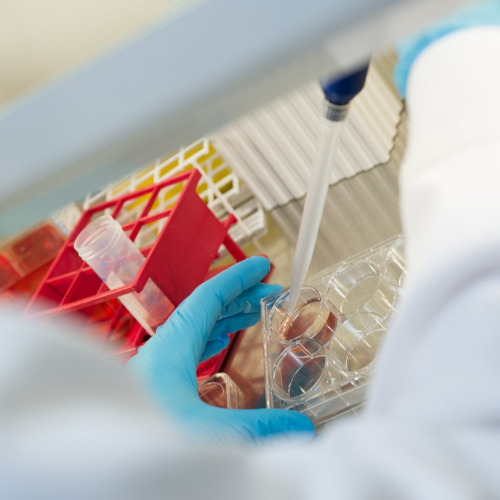
Lucas Nygård
Doctoral Researcher
Institute of Clinical Medicine, School of Medicine, Faculty of Health Sciences
Research groups
PhD research project
Type 1 diabetes (T1D) is the world’s most prevalent pediatric metabolic disease, with almost 100,000 children under the age of 15 who fall ill each year. Despite extensive research, the pathogenesis of T1D remains largely elusive. Still, the genetic background of T1D is evidently multifactorial as the inheritance of various human leukocyte antigen (HLA) genes, single nucleotide polymorphisms (SNPs) and short tandem repeats (STRs) produce a predisposed phenotype. Nevertheless, also environmental factors, such as early-life virus infections and nutritional factors, exert risk effects that redirect immune-system development or facilitate autoimmune reactions.
It is currently unclear how individual gene variants, especially SNPs, induce susceptibility to T1D via alterations to immunological or metabolical pathways. Most of the disease-associated SNPs are found in genes which are functionally important for immune cells, although, in most cases, the SNPs’ phenotype-modifying effects still remain undetermined. Nonetheless, this is a nescience which can be resolved by quantifying the SNPs’ postulated effects using modern immunophenotyping methodologies in a well-characterized clinical cohort.
The goal of the doctoral thesis is to study autoimmunity-associated polymorphisms and their causal effects on the phenotype of immune cells. Specifically, starting from the known hereditary genetic predisposition, we search for functional differences in the phenotype, coining the project GenoPheno (from genotype-to-phenotype).
-
To study the genotype-to-phenotype effects caused by T1D-associated SNPs, we have generated a novel study cohort from subjects participating in the Finnish Diabetes Prediction and Prevention (DIPP) study. Since 1994, the DIPP study has screened newborns for the presence of HLA genes predisposing to T1D, and conducted a longitudinal follow-up. The follow-up includes a periodical blood sampling that allows for the screening for autoantibodies (AAb), in tandem with the extraction and cryopreservation of peripheral blood mononuclear cells (PBMCs). The novel DIPP subcohort, named GenoPheno, consists of 694 healthy, AAb-negative children genotyped for autoimmunity-associated polymorphisms thought to modify the immunophenotype. The GenoPheno project’s goals, structure and methodologies have previously been thoroughly presented in the applicant’s MSc thesis. The core aim of the GenoPheno project, and of the doctoral thesis, is to isolate and determine the causal effects of T1D-associated SNPs on immune cells
-
The GenoPheno cohort was established to phenotype young children (≤5 years of age) who should have a less heterogeneous immunophenotype due to a restricted immunization history and limited exposure to environmental risk factors. This approach is postulated to reduce cohort heterogeneity and improve our chances of detecting subtle SNP-mediated alterations in the immunophenotype, thus enabling us to use smaller sample sizes.
Various ex vivo immune assays, such as multiparameter flow cytometry, single cell transcriptomics with the BD Rhapsody platform, as well as cytokine secretion, proliferation and suppression assays, have already been implemented by the research group in previous studies of immune-cell function. The GenoPheno project will now also utilize these assays to compare immune cells from individuals carrying T1D-associated or protective alleles in each locus of interest. By genotyping multiple SNPs within one locus, it is possible to enrich for genotypes that isolate specific variants, or completely lack the risk variants. Moreover, when SNP-mediated alterations in the non-diabetic immunophenotypes are identified, our intention is to evaluate the alterations’ relevance for autoimmunity by analyzing additional samples from individuals with established autoimmunity, i.e., in AAb-positive and diabetic children.
-
We expect our translational approach to generate important new insights into the pathogenesis of T1D, and, potentially, elucidate the common mechanisms behind the genetic predisposition to autoimmunity. This information can, in turn, potentially be translated into novel immunotherapeutic approaches or prognostic biomarkers for T1D risk stratification. Since T1D is a common pediatric autoimmune disease, scientific progress in understanding the disease mechanisms better may have considerable societal impact. Even though our thesis project focuses on the effects of gene variants associated with T1D, the same polymorphisms increase susceptibility to a spectrum of autoimmune and non-autoimmune diseases. Our results have, therefore, a direct translational impact by explaining the genetic etiology of multiple pathologies.
Publications
4/4 items-
Mechanism of biomimetic virus-like nanoparticles in triggering immune response elucidated by proteomics
Wang, Jiajia; Montaser, Ahmed; Sivonen, Minna; Leinonen, Henri; Nygård, Lucas; Kinnunen, Tuure; Pitkänen, Sini; Levonen-Harju, Anna-Liisa; Batnasan, Enkhzaya; Latonen, Leena; Hepojoki, Jussi; Ma, Leyuan; Lehto, Vesa-Pekka; Xu, Wujun, 2025, Colloids and surfaces b: biointerfaces, 259, 115338. A1 Journal article (refereed), original research -
Increased Frequency of the HLA-DRB1*04:04-DQA1*03-DQB1*03:02 Haplotype Among HLA-DQB1*06:02–Positive Children With Type 1 Diabetes
Ilonen, Jorma; Kiviniemi, Minna; El-Amir, Mostafa I.; Nygård, Lucas; Härkönen, Taina; Lempainen, Johanna; Knip, Mikael; Knip, Mikael; Groop, Per-Henrik; Ilonen, Jorma; Otonkoski, Timo; Veijola, Riitta; Abram, Alar; Aito, Henrikka; Arkhipov, Ivan; Blanco-Sequeiros, Elina; Bondestam, Jonas; Granholm, Markus; Haapalehto-Ikonen, Maarit; Horn, Torsten; Huopio, Hanna; Janer, Joakim; Johansson, Christian; Kalliokoski, Liisa; Keskinen, Päivi; Kinnala, Anne; Korteniemi, Maarit; Laakkonen, Hanne; Lähde, J, 2024, Diabetes, 73, 2, 306-311. A1 Journal article (refereed), original research -
The effect of type 1 diabetes protection and susceptibility associated <scp>HLA</scp> class <scp>II</scp> genotypes on <scp>DNA</scp> methylation in immune cells
Pahkuri, Sirpa; Katayama, Shintaro; Valta, Milla; Nygård, Lucas; Knip, Mikael; Kere, Juha; Ilonen, Jorma; Lempainen, Johanna; Finnish Pediatric Diabetes Register, 2024, HLA, 103, 6, e15548. A1 Journal article (refereed), original research -
CXADR polymorphism rs6517774 modifies islet autoimmunity characteristics and exhibits sex disparity
Nygård, Lucas; Valta, Milla; Laine, Antti Pekka; Toppari, Jorma; Knip, Mikael; Veijola, Riitta; Hyöty, Heikki; Ilonen, Jorma; Lempainen, Johanna, 2023, Frontiers in genetics, 14, 1248701. A1 Journal article (refereed), original research

